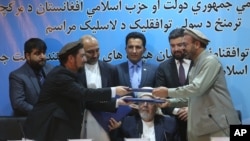A peace deal signed with a notorious Afghan warlord is opposed by some political figures and rights groups who worry about its impact on the country’s fledgling democracy.
Thursday's agreement opens a new chapter for Gulbuddin Hekmatyar, who fought against the Soviet Union in the 1980s and whose fighters were once beneficiaries of CIA support. He was later accused of abuses during Afghanistan's brutal civil war in the 1990s and designated as a terrorist by the United States in 2003 for his support of al-Qaida.
Political analysts say concerns over the warlord's return to politics are legitimate, and much depends on how he acts going forward.
Michael Semple, an Afghanistan expert at Queen's University Belfast's Institute for the Study of Conflict Transformation and Social Justice, voiced optimism about the peace deal, telling VOA that Hekmatyar can play a positive role in Afghanistan if Hekmatyar distances himself from the political mindset of the 1980s and 1990s and embraces democratic change.
"In the period when Hekmatyar was one of the key stakeholders in Afghanistan, there was no genuine democratic politics; there was no guarantees for the rights of the population; the only way the people were able to conduct their politics was through forces, violence and often through conspiracies. Those are no longer necessary; they no longer offer a way for somebody to advance in politics," Semple added.
To have a positive role in the political future of Afghanistan, Semple says Hekmatyar should "do politics without resorting to force."
Old foes wary
Following the invasion of Afghanistan by the former Soviet Union, Hekmatyar attracted followers across Afghanistan to fight against a Russian-backed regime in the country, but also provoked tough opponents among other militant factions, who repeatedly clashed over territorial control.
In the past 15 years, however, most of the warlords who fought Hekmatyar during the civil war of the 1990s have gained high-ranking positions in the internationally-backed government in Afghanistan. Some of them still oppose him, and objected to signing a peace deal with him.
Lisa Curtis, a South Asia expert at The Heritage Foundation’s Asian Studies Center, says their opposition comes from both their history of animosity, and wariness about the political power he could wield.
"I think it is both: fear and hatred," she said. "Look, the U.S. has enlisted him a specially designated terrorist leader. He has been involved in attacks, involved U.S. casualties. So, this is somebody that has a really very bad track record in the country."
Considering the complexity of political conflict in Afghanistan, she says, the implementation of the peace deal with Hekmatyar will experience ups and downs.
Despite the catastrophic records of warlords such as Hekmatyar in Afghanistan, Curtis believes that the peace deal is a good first step for Afghanistan to gradually rid itself of decades of intractable conflict and move towards stability.
"We should focus on moving Afghanistan beyond its troubled history, which of course includes human rights abuses and inexcusable violence by several different actors," Curtis said, adding that the peace deal could move Afghanistan toward a better future.
Following the fall of the Taliban regime in late 2001, Hekmatyar, then living in self-exile in Iran, apparently returned to Afghanistan, where he opposed both politically and militarily the internationally-backed regime in Afghanistan and on several occasions, claimed responsibility for lethal attacks in Afghanistan.
However, in the past 15 years, the Taliban and its affiliated groups such as the Haqqani Network, were responsible for most of the violence across Afghanistan -- not Hekmatyar’s group.
Given Hekmatyar's comparatively diminished military strength in the past 15 years, Semple from Belfast Queen's University's Institute believes that the peace deal with him is most significant in how it serves as an example for others. He says that if Hekmatyar, a prominent Islamic leader, has joined peace, many could ask why not others -- including the Taliban?
Omar Samad, a U.S.-based former Afghan diplomat who has actively supported the anti-Hekmatyar group Jamiat-Islami, is skeptical about a positive outcome of the peace deal. Like Semple, he argues that Hekmatyar’s next move could have an impact on the viability of broader peace efforts.
"His [Hekmatyar] background is known as a fundamentalist, leading a faction during the Soviet occupation. Then [he] became embroiled in domestic warfare, and then somehow defeated by new forces and became less relevant. This time, there are some indications that he may be more inclined to his ethnic identity to pursue politics," Samad told VOA.
He said in the coming weeks and months, Hekmatyar will show whether he follows his fundamentalist stance or he is reformed and willing to play by the new rules.
Among other western nations, the United States welcomed the peace agreement with Hekmatyar.
"We applaud both parties for seeking a peaceful resolution through political dialogue and negotiation, and we commend the agreement as an important demonstration of the Afghan government’s commitment to restoring peace and stability in Afghanistan," the White House said in a statement.
For now, analysts point to the deal as removing one militant group that had been working against the internationally-backed Afghan government.
"The more conspirators, the more people resorting to force, the more difficult it is to maintain stability in Afghanistan," said Michael Semple.

